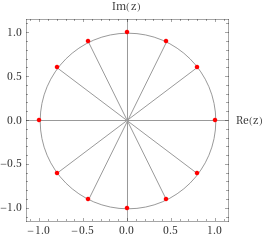You need to solve the following equation for $z=e^{ix}$
$$\left(z^2+1\right) \left(z^{2 n}-1\right)-n \left(z^2-1\right) \left(z^{2 n}+1\right)=0.$$
MathematicaWolfram Alpha can do that for you, or even Wolfram Alpha. The answer is in radicals for $n\leq 7$,for example
$$n=7\Rightarrow z=\sqrt{\frac{1}{6} \left(\sqrt{7}+i \sqrt{2 \left(\sqrt{7}+14\right)}-1\right)}.$$
Note that $|z|=1$, so $x$ is real. This is one of the solutions, for the others you vary the sign of the square roots. None of this is particularly insightful (and there are also roots at $\pm 1$ and $\pm i$, see figure).

